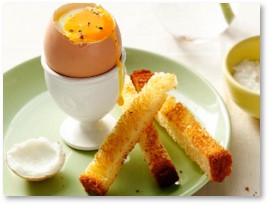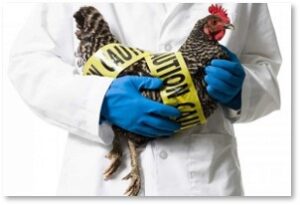 My husband and I love eggs. We eat a lot of them. Eggs are good for you, not fattening, and very filling. A large egg contains 78 calories, 5g of fat, less than 1g carbohydrate, 6g of protein, and 147mg of choline, which supports memory and mood. Although eggs are high in cholesterol, eating them has very little effect on blood cholesterol levels in most people.
My husband and I love eggs. We eat a lot of them. Eggs are good for you, not fattening, and very filling. A large egg contains 78 calories, 5g of fat, less than 1g carbohydrate, 6g of protein, and 147mg of choline, which supports memory and mood. Although eggs are high in cholesterol, eating them has very little effect on blood cholesterol levels in most people.
Eggs taste great almost any way you prepare them — and they’re easy and fast to prepare.
Until very recently, they were also cheap. How many foods combine all those benefits?
Why High Egg Prices?
 Yet, now eggs have become expensive. Very expensive. A dozen eggs can cost more than a steak—certainly more than a pound of hamburger or a package of chicken. That’s expensive protein.
Yet, now eggs have become expensive. Very expensive. A dozen eggs can cost more than a steak—certainly more than a pound of hamburger or a package of chicken. That’s expensive protein.
The incredible edible egg is getting close to being priced right out of the shopping cart.
Why? Well, there are several reasons:
- The increased cost of chicken feed
- The higher price of nutritional supplements for the hens
- The escalating cost of electricity to keep the hens warm
- The inflated cost of cartons to ship the eggs
And last, but certainly not least, we have the bird flu that not only killed hens but drove farmers to destroy mountains of chickens to prevent further infection.
Too Sick to Cross the Road
 The shell-egg industry has been plagued by a long-running avian flu. The highly pathogenic avian influenza that began in 2022 has led to the deaths of about 58 million birds. Either because it killed them or the farmers had to destroy birds to keep the flu from spreading.
The shell-egg industry has been plagued by a long-running avian flu. The highly pathogenic avian influenza that began in 2022 has led to the deaths of about 58 million birds. Either because it killed them or the farmers had to destroy birds to keep the flu from spreading.
In “Egg Prices Have Soared 60% in a Year: Here’s Why They’re So Expensive,” Patrick Thomas and Jaewon Kang explain:
“U.S. egg inventories were 29% lower in the final week of December 2022 than at the beginning of 2022, according to the USDA. More than 43 million egg-laying hens had died as a result of the malady by the end of December.”
It takes a while for birds to mature to the point where they can lay eggs. Eventually, though, the stocks will rebound and prices will decline—at least somewhat. Other inflationary pressures will continue to apply.
The Short-Term Scramble
This price spike is coming home to roost as people just stop shelling out for pricy eggs. That will be a problem for the industry because you can’t keep fresh eggs in back inventory until prices stabilize and demand increases. There’s no such thing as a vintage egg.
 In the meantime, however, egg prices of $5 a dozen or more are driving up the cost of other goods. The prices of all goods with eggs in the ingredients will go up and stay up as long as eggs remain expensive. Eggs are critical ingredients for items, such as:
In the meantime, however, egg prices of $5 a dozen or more are driving up the cost of other goods. The prices of all goods with eggs in the ingredients will go up and stay up as long as eggs remain expensive. Eggs are critical ingredients for items, such as:
- Cakes, muffins, pancakes and waffles
- Puddings, custards and flan
- Quiche
- Meatloaf
- Egg noodles
- Mayonnaise
- Creamy salad dressing
Thank goodness the holidays are over, so we don’t face an eggnog shortage.
Let us not forget those wonderful free hotel breakfasts that feature both scrambled eggs and omelet stations. I predict that the buffet will shrink soon, if it has not already done so. Oatmeal may soon take star position.
In the meantime, however, free-range social media is making the best of carton sticker shock by putting up funny memes. Cartoonists have jumped into the fray with their own takes on eggs as a luxury item.
Decisions in the Dairy Aisle
 The rest of us will simply approach the dairy aisle with some trepidation, afraid to look but needing that wonderful eggy breakfast. We will make some trade-offs, eliminating some things so we can afford eggs.
The rest of us will simply approach the dairy aisle with some trepidation, afraid to look but needing that wonderful eggy breakfast. We will make some trade-offs, eliminating some things so we can afford eggs.
And we will be very happy when inflation eases off and eggs cease to be luxury items.
